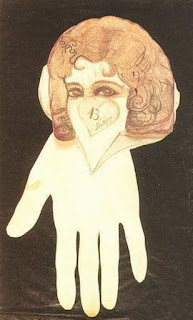The Ghost of Nadja
"Who am I? What if, exceptionally I returned to a saying : indeed why would everthing not come down to knowing whom I 'haunt.' I must admit that this latter word leads me astray, as it tends to establish between certain beings and myself relationships that are more singular, less avoidable, more disturbing than I thought. It says much more than it means, than it wishes to say. It makes me play while alive the role of a ghost, obviously it alludes to the obligation that I must cease to be in order to be who I am."*
-André Breton, Nadja, my translation
Thus opens Breton's strange book known as Nadja. The saying he refers to is "Tell me whom you haunt and I'll tell you who you are."
The narrative came across my path the first summer of my time at the Sainte-Chapelle when I was under the spell of young Dante's Vita Nova and its games of medieval love. A colleague slipped it to me as if to say "If you like the Dolce Stil Novo you'll love Nadja" (itself a comic twist on Breton's own 'If you like love, you will love Surrealism"). It's true that the book recalls medieval romances in its structure and in some of its themes. And love was hardly the word; I devoured it.
In 1926, Breton crossed paths with an enigmatic and strangely beautiful young woman whose name had long been lost to history, a phantomatic figure who defied researchers' attempts to unearth her identity. She is known as "Nadja" for the word, said Breton, that was the beginning of the Russian word for hope - but only its beginning. She lived by her wits and other expediencies. They fell madly in love and lived this passion at fever pitch, from the fourth to the thirteenth of October. And in that short stretch of time they seemed to write one another as much as they in fact met. Her letters in their original French can be consulted here with a selection translated into English here .
Some of Breton's personal papers having come into public view, researchers now can put a name and a full face to the apparition of eyes embedded in the writer's text.
Her name was Leona Delcourt
Unwed and a mother in 1920 she refused to marry for appearances' sake and ended up sent to Paris where she lived on small roles as an actress and dancer, making shift with odd jobs and small-time dealing of drugs, An artist, her images captivated Breton and made up an integral part of his fascination with her.
"From the first day to the last, I took Nadja for a free djinn/genius, something like one of those spirits of the air for which certain magical practices allow a momentary attachment, but never submission. I saw her eyes of fern open in the morning upon a world where the beating of wings of immense hope are barely distinct from other noises of terror, and upon this world, I have only ever seen eyes close." ** (my very clumsy translation)
A nervous breakdown led her to be committed in 1927. She died there of hunger in January of 1941 at 38 years old. She never received in all those years a single visit from Breton. He did, however, write Nadja. It took him the mere month of August of the year of her internment to write the first two thirds, with the final part complete in December. Some two hundred pages are dedicated to their nine-day affair, speaking of the ink needed to exorcise her from his mind and heart.
Breton's opening seems to imply that he haunted Leona, or at least the Nadja that he had made of her, In one of her letters she describes it as a skewed and distorted portrait. He must however, to have made such an unforgettable portrayal, however inaccurate in her eyes, been haunted in his turn. Her figure is certainly part of the image conjured by the Surrealist at the mention of his name.
Some fifteen years after having read the story, she continues also to haunt my thoughts. But so many decades after her passing it is she who has in fact become part of who I am
*(Qui suis-je ? Si par exception je m'en rapportais à un adage: en effet pourquoi tout ne reviendrait-il pas à savoir qui je « hante » ? Je dois avouer que ce dernier mot m'égare, tendant à établir entre certains êtres et moi des rapports plus singuliers, moins évitables, plus troublants que je ne pensais. Il dit beaucoup plus qu'il ne veut dire, il me fait jouer de mon vivant le rôle d'un fantôme, évidemment il fait allusion à ce qu'il a fallu que je cessasse d'être pour être qui je suis.)
**J'ai pris, du premier au dernier jour, Nadja pour un génie libre, quelque chose comme un de ces esprits de l'air que certaines pratiques de magie permettent momentanément de s'attacher, mais qu'il ne saurait être question de se soumettre. J'ai vu ses yeux de fougère s'ouvrir le matin sur un monde où les battements d'ailes de l'espoir immense se distinguent à peine des autres bruits qui sont ceux de la terreur et, sur ce monde, je n'avais vu encore que des yeux se fermer.






.jpg)
Comments
Post a Comment